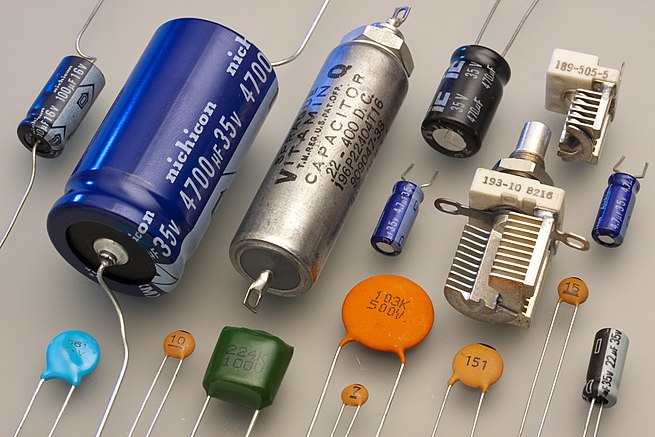
-
Capacitor
A capacitor is a passive two-terminal electrical component that stores potential energy in an electric field. The effect of a capacitor is known as capacitance. While some capacitance exists between any two electrical conductors in proximity in a circuit, a capacitor is a component designed to add capacitance to a circuit. The capacitor was originally known as a condenser.
The physical form and construction of practical capacitors vary widely and many capacitor types are in common use. Most capacitors contain at least two electrical conductors often in the form of metallic plates or surfaces separated by a dielectric medium. A conductor may be a foil, thin film, sintered bead of metal, or an electrolyte. The nonconducting dielectric acts to increase the capacitor’s charge capacity. Materials commonly used as dielectrics include glass, ceramic, plastic film, paper, mica, and oxide layers. Capacitors are widely used as parts of electrical circuits in many common electrical devices. Unlike a resistor, an ideal capacitor does not dissipate energy.
When two conductors experience a potential difference, for example, when a capacitor is attached across a battery, an electric field develops across the dielectric, causing a net positive charge to collect on one plate and net negative charge to collect on the other plate. No current actually flows through the dielectric, however, there is a flow of charge through the source circuit. If the condition is maintained sufficiently long, the current through the source circuit ceases. However, if a time-varying voltage is applied across the leads of the capacitor, the source experiences an ongoing current due to the charging and discharging cycles of the capacitor.
Capacitance is defined as the ratio of the electric charge on each conductor to the potential difference between them. The unit of capacitance in the International System of Units (SI) is the farad (F), defined as one coulomb per volt (1 C/V). Capacitance values of typical capacitors for use in general electronics range from about 1 picofarad (pF) (10−12 F) to about 1 millifarad (mF) (10−3 F).
The capacitance of a capacitor is proportional to the surface area of the plates (conductors) and inversely related to the gap between them. In practice, the dielectric between the plates passes a small amount of leakage current. It has an electric field strength limit, known as the breakdown voltage. The conductors and leads introduce an undesired inductance and resistance.
Capacitors are widely used in electronic circuits for blocking direct current while allowing alternating current to pass. In analog filter networks, they smooth the output of power supplies. In resonant circuits they tune radios to particular frequencies. In electric power transmission systems, they stabilize voltage and power flow. The property of energy storage in capacitors was exploited as dynamic memory in early digital computers.
-
Capacitor (noun)
An electronic component capable of storing electrical energy in an electric field; especially one consisting of two conductors separated by a dielectric.
-
Battery (noun)
A device used to power electric devices, consisting of a set of electrically connected electrochemical or, archaically, electrostatic cells. A single such cell when used by itself.
-
Battery (noun)
The infliction of unlawful physical violence on a person, legally distinguished from assault, which includes the threat of impending violence.
-
Battery (noun)
A coordinated group of artillery weapons.
-
Battery (noun)
An elevated platform on which cannon could be placed.
-
Battery (noun)
An array of similar things.
“Schoolchildren take a battery of standard tests to measure their progress.”
-
Battery (noun)
A set of small farming their eggs.
-
Battery (noun)
The catcher and the pitcher together
-
Battery (noun)
Two or more major pieces on the same rank, file, or diagonal
-
Battery (noun)
A marching percussion ensemble; a drumline.
-
Battery (noun)
The state of a firearm when it is possible to be fired.
-
Battery (noun)
Apparatus for preparing or serving meals.
-
Capacitor (noun)
a device used to store an electric charge, consisting of one or more pairs of conductors separated by an insulator.
